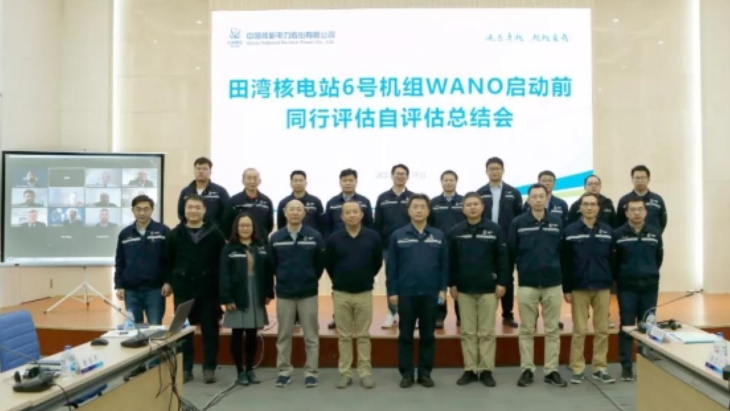Pre-startup peer review conducted remotely at Chinese reactor
The World Association of Nuclear Operators (WANO) has completed a pre-startup peer review (PSUR) of unit 6 at the Tianwan nuclear power plant in China's Jiangsu province. Travel restrictions amid the pandemic meant the review of the domestically-designed ACPR1000 was carried out using local experts on-site with WANO experts participating remotely.

The team of local experts who conducted the on-site assessment at Tianwan 6 (Image: CNNC)
The PSUR is a globally recognised nuclear industry assessment conducted in line with international industry standards set by WANO and carried out prior to initial criticality at a new reactor. Such reviews examine numerous functional and cross-functional areas that are essential for the safe startup and operation of reactors. These range from operator performance and operations and maintenance, through to work management and emergency preparedness.
China National Nuclear Corporation (CNNC) announced on 27 January the PSUR at Tianwan 6 was conducted on 9-20 January.
The Tianwan plant is owned and operated by Jiangsu Nuclear Power Corporation, a joint venture between CNNC (50%), China Power Investment Corporation (30%) and Jiangsu Guoxin Group (20%).
CNNC said Jiangsu Nuclear Power and the WANO Moscow Centre held discussions in November and early December last year to jointly seek solutions to carrying out the review during the ongoing pandemic. With the strong support of China Nuclear Energy Industry Association (CNEIA), the three parties reached agreement, it said. An on-site assessment team was formed by experts from outside the association and power plant experts, including specialists from CNNC, China General Nuclear and the State Power Investment Corporation. WANO international experts provided online remote guidance to jointly carry out the evaluation of Tianwan 6. The assessment information was transferred and exchanged between the power plant, the on-site assessment team and the remote assessment team.
At the evaluation summary meeting, Hilgay Vebonov, deputy director of WANO Moscow Centre, and Zheng Weiping, deputy secretary-general of CNEIA, affirmed the evaluation work and praised the high-level skills and professionalism of the Chinese and overseas evaluators.
Units 5 and 6 at Tianwan - Tianwan Phase III - both feature ACPR1000 reactors. First safety-related concrete was poured for unit 5 on 27 December 2015, with that for unit 6 poured on 7 September 2016. Tianwan 5 entered commercial operation in September last year. Hot functional testing of unit 6 was completed on 29 December and the reactor is expected be started up later this year.
The first four units at the site - which began commercial operation between June 2007 and December 2018 - are Gidropress VVER units supplied by Russia, as will be the seventh and eighth, for which a general contract was signed in March 2020.
A not-for-profit organisation, WANO's members operate some 460 nuclear units in over 30 countries and regions worldwide. WANO works with its members to assess, benchmark and improve performance through mutual support, exchange of information and emulation of best practice.
Researched and written by World Nuclear News
- China Institute of Atomic Energy
- Nuclear Power Institute of China
- Southwestern Institute of Physics
- China Nuclear Power Operation Technology Corporation, Ltd.
- China Nuclear Power Engineering Co., Ltd.
- China Institute for Radiation Protection
- Beijing Research Institute of Uranium Geology (BRIUG)
- China Institute of Nuclear Industry Strategy (CINIS)
- China Nuclear Mining Science and Technology Corporation


